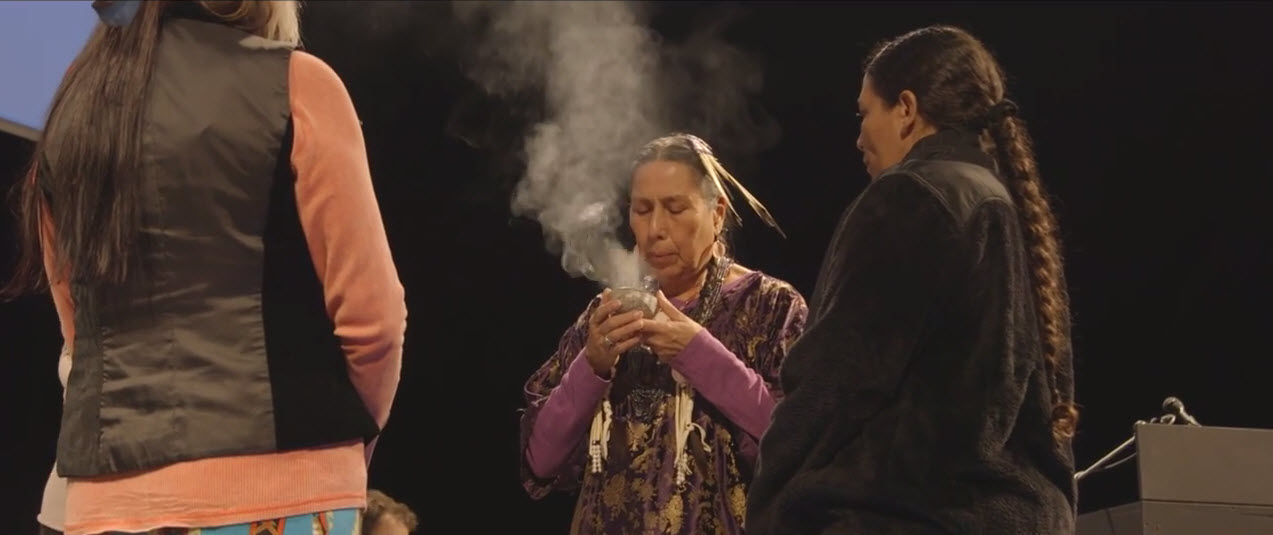The current ecological crisis requires that we transform our international and domestic legal systems to nurture, rather than allow the destruction of the Earth community.
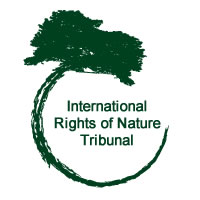 The third International Rights of Nature Tribunal was held concurrently with the United Nations Framework Convention on Climate Change (UNFCCC COP 21) at Maison des Métallos in Paris, France. Hosted by the Global Alliance of the Rights of Nature in partnership with End Ecocide on Earth, NatureRights & Attac France, the panel of judges consisting of internationally renowned lawyers and leaders for planetary justice heard evidence and pronounced judgments on 4 cases after the first day and 4 cases on day 2.
The third International Rights of Nature Tribunal was held concurrently with the United Nations Framework Convention on Climate Change (UNFCCC COP 21) at Maison des Métallos in Paris, France. Hosted by the Global Alliance of the Rights of Nature in partnership with End Ecocide on Earth, NatureRights & Attac France, the panel of judges consisting of internationally renowned lawyers and leaders for planetary justice heard evidence and pronounced judgments on 4 cases after the first day and 4 cases on day 2.
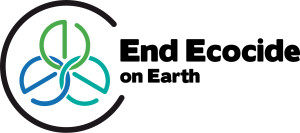 The Tribunal is a unique, citizen-created initiative that relies on the mandate granted to it through the Universal Declaration of the Rights of Mother Earth. It gives people from all around the world the opportunity to testify publicly as to the destruction of the Earth. The Tribunal provides a systemic alternative to environmental protection, acknowledging that ecosystems have the right to exist, persist, maintain and regenerate their vital cycles.
The Tribunal is a unique, citizen-created initiative that relies on the mandate granted to it through the Universal Declaration of the Rights of Mother Earth. It gives people from all around the world the opportunity to testify publicly as to the destruction of the Earth. The Tribunal provides a systemic alternative to environmental protection, acknowledging that ecosystems have the right to exist, persist, maintain and regenerate their vital cycles.
The Tribunal features internationally renowned lawyers and leaders for planetary justice, who hear cases addressing issues such as climate change, GMOs, fracking, extractive industries and other environmental violations. The Tribunal offered judgments and recommendations for the Earth’s protection and restoration based on the Universal Declaration of the Rights of Mother Earth. Among other things, the Declaration binds us to respect the integrity of the vital ecological processes of the Earth. 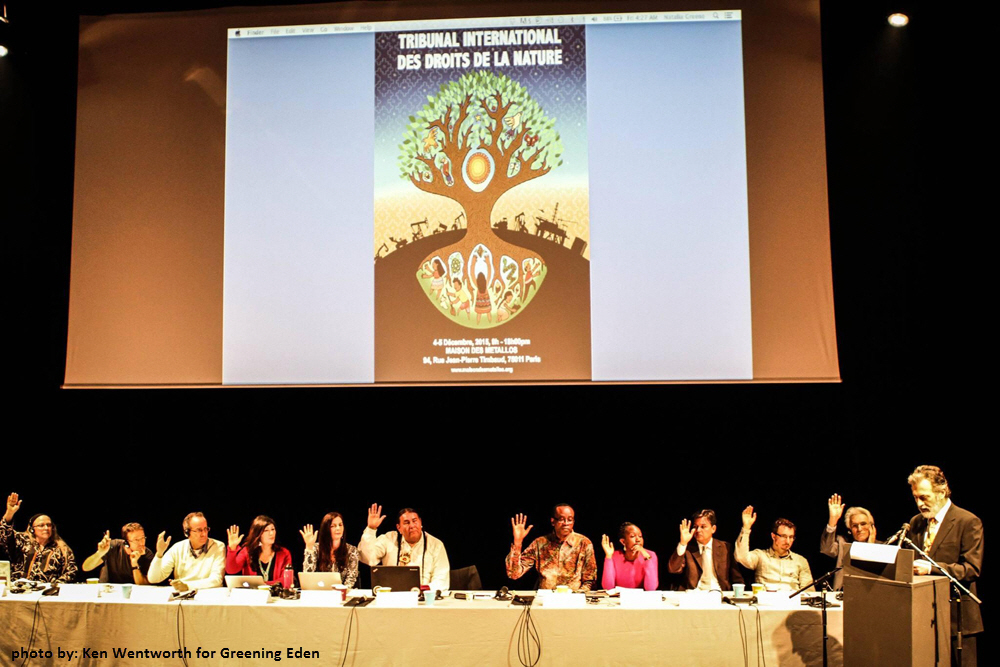 Accordingly, the Declaration also helps advance proposed amendments to the Rome Statute of the International Criminal Court to recognize the crime of Ecocide. The Tribunal has a strong focus on enabling indigenous peoples and local communities to share their unique concerns and solutions about land, water and culture with the global community.
Accordingly, the Declaration also helps advance proposed amendments to the Rome Statute of the International Criminal Court to recognize the crime of Ecocide. The Tribunal has a strong focus on enabling indigenous peoples and local communities to share their unique concerns and solutions about land, water and culture with the global community.
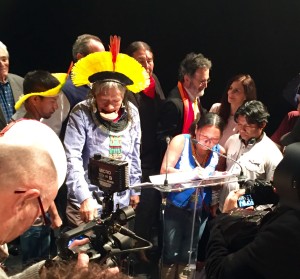
The Tribunal opened on December 4 with a formal signing of the Tribunal Convention by Tribunal delegates and Indigenous Leaders from around the world. Shown here is the signing by Chief Raoni of the Kayapo people of the Brazilian Amazon and Tribunal Officiates.
Click for President’s Closing Statement
Click for Paris Tribunal Press Release PDF
Download the Final Program Agenda
International Rights of Nature Tribunal Agenda
- Session 1 – Friday am
- Opening Ceremonies
- Climate Crimes Against Nature
- Session 2 – Friday pm
- Session 3 – Saturday am
- Session 4 – Saturday pm
Judges
Among the esteemed panel of judges: (Click for biographies)
- Cormac Cullinan, President; Author WildLaw: A Manifesto for Earth Justice (South Africa)
- Tom Goldtooth, Indigenous Environmental Network (Turtle Island, USA)
- Alberto Acosta, Economist and former President Ecuador Constitutional Assembly (Ecuador)
- Osprey Orielle Lake, Women’s Earth and Climate Action Network (USA)
- Nnimmo Bassey, Health of Mother Earth Foundation/Oilwatch (Nigeria)
- Ruth Nyambura, Political ecologist, African Ecofeminists Collective (Kenya)
- Damien Short, University of London (United Kingdom)
- Felício Pontes, Federal Prosecutor (Brazil)
- Terisa Turner, professor Sociology and Anthropology, former UN Energy Specialist (Canada)
- Atossa Soltani, Amazon Watch (USA)
- Christophe Bonneuil, Historian of Sciences, Attac (France)
- Philippe Desbroses, Honorary – 4 Dec, farmer, scientist, writer (France)
- Dominique Bourg, Honorary – 5 Dec, Professor Geosciences, University of Lausanne (Switzerland)
Click for Judges Statements
Prosecutors for the Earth
- Ramiro Avila, Universidad Andina Simón Bolivar (Ecuador)
- Linda Sheehan, Earth Law Center (USA) – Closing Statement
International Rights of Nature Tribunal Paris Secretariat
- Natalia Greene, Global Alliance for the Rights of Nature
Secretariat Advisers
- Edgardo Lander, Venezuela
- Joan Martines Alier, Spain
- Enrique Viale, Argentina
- Thomas Coutrot, France
- Fernando Pino Solanas, Argentina
December 4 – Day 1
On opening day, the Tribunal heard 4 cases alleging Climate Crimes Against Nature, the “financialisation” of Nature through market mechanisms as a crime rather than a solution, crimes committed by the Agro-Food Industry, and crimes being committed against those defending Mother Earth.
Presenter Pablo Solón (Fundacion Solon, Focus on the Global South)
| Topic | Expert | Witness/Victim |
| Fossil Fuels | Maxime Combes (Attac France) | Desmond D’sa (South Africa) |
| Deforestation | Miguel Lovera (Global Forest Coalition, Paraguay) and David Kureeba (Global Forest Coalition, Uganda) | |
| Water and Climate | Maude Barlow (Council of Canadians) | Michal Kravcik (Slovakia) |
| Market Mechanisms, Climate Smart Agriculture, Land Use | Badrul Alam (LVC & President, Bangladesh Krishok Federation) and Maria Isabel Carrillo (CONAVIGUA) | |
| Bio-Energy with Carbon Capture and Storage (BECCS) | Pat Mooney (ETC Group) | |
| Free Trade Agreements | Tony Clark (Polaris Institute, Canada) | |
| Geoengineering | Silvia Ribeiro (ETC Group Mexico) | |
| Nuclear | Roland Desbordes (CRIIRAD) | Alexei Nesterenko (Belarus) |
The panel of Judges heard a range of evidence given by experts and witnesses on the inadequacy of current climate change policies to prevent a 2 degree increase of temperature; the culpability of agri-business, fossil fuel extraction and generation companies in advocating false solutions to climate change risks based on market mechanisms and massive geo-engineering projects; the irreversible harm on vital processes of life and generations of humans after the Chernobyl nuclear disaster, and the serious consequences on Mother Earth and human communities when water is privatised as a resource water rather than being treated as a sacred source for life to exist.
Osprey Orielle Lake and Nnimmo Bassey gave preliminary judgment on behalf of the Panel, concluding that the arguments were well founded as to why the rights enshrined in the Universal Declaration had been breached. Climate Change was a systemic violation of the Inherent Rights of Mother Earth listed at Article 2 of the Universal Declaration. Nuclear pollution was an irreparable harm on future generations. Recommendations were made for removing access to water from market mechanisms, and a 10 point action plan was pronounced by Osprey Orielle Lake on immediate actions needed to be taken to move towards climate justice for Mother Earth and human communities. This case was declared closed with a full written judgment to be issued in due course.
Read Osprey Orielle Lake’s judge’s statement.
Read Two Good Days When Crimes Against Nature Were Exposed by Nnimmo Bassey
Presenter Ivonne Yanez (Acción Ecológica, Ecuador)
| Compensation mechanisms linked to biodiversity conservation | Genevieve Azam (Attac France) | Gloria Ushigua (Sápara, Ecuador), Sengwer Indigenous representative – video – (Kenya, Africa) |
| EU biodiversity offsets, WRM Report on REDD+, economic valuation of nature | Jutta Kill (biologist, Germany) |
Particular emphasis was placed on how the trend towards market-based solutions to climate change are actually violations of Article 2 Rights rather than solutions the complicity of governments and corporations that and evidence was
After hearing evidence on how governments at COP21 are negotiating for so-called “Intended Nationally Determined Contributions” (INDCs) that they fully and intentionally know will collectively be above the 2 degree rise in temperature, Tom Goldtooth gave preliminary judgment that all the evidence was accepted as well founded and a case had been made for breaches of the Universal Declaration. He felt impelled to recognise life rather than instruments that sought to measure and quantify Mother Earth’s vital life cycles as a commodity to be sold. He declared commodification to be a violence to the sacred trust on humans to live in harmony with Mother Earth, as enshrined in Article 3 of the Universal Declaration. The wounds on Mother Earth cannot be compensated for, they must be healed at source. He made recommendations that further actions be taken to identify the perpetrators and accessories to the crimes being committed.
Agro-food Industry/GMOs (Judge: Phillippe Desbrosses)
Presenter: Vandana Shiva (Navdanya)
| Marie-Monique Robin (Journalist), Ronnie Cummins (Organic Consumers Association (OCA)) | José Bové (Green European Deputee), Andre Leu (IFOAM) |
Dr. Vandana Shiva, together with witnesses and experts she called, presented a case for why the actions of the Agro-food Industry were violations of Natures Rights on a massive scale. Corporations such as Monsanto were defining and owning the processes of life through their patents of genetically modified seeds, violating the fundamental right of Mother Earth to her vital life cycles and increasing the financial dependence of cotton seed farmers in India on their BT1 and BT2 seeds leading to the suicide of over 300,000 farmers. Evidence was also given on how Monsanto’s “Roundup” pesticide had become one of the greatest health scandals on the planet and how the agro-food business as a whole system was contributing far in excess of the 15% of global GHG emissions usually cited.
View videos of Agro-food Industry/GMOs case presentation and judge’s statement.
| Criminalization of defenders of Mother Earth in Ecuador | Belén Páez (Pachamama Foundation), Manari Ushigua (Sápara leader), Braulio Gutierrez (Yasunidos) |
| Fossil fuel and chemical contamination | Yudith Nieto, and Bryan Parras (USA-Houston TX, T.E.J.A.S) |
Manari Ushigua (Sápara leader), Braulio Gutierrez (Yasunidos), and Belén Páez (Executive Director, Pachamama Foundation) presented the case of the criminalization of defenders of Mother Earth that is occurring in Ecuador. Presenters detailed the ruthlessness of actions being taken against Defenders. Yudith Nieto, Juan and Byron Parras (USA-Houston TX, T.E.J.A.S) presented the case demonstrating the devastating effects of Fossil fuels and chemical contamination on communities in Ecuador and around the world. The 2nd International Rights of Nature Tribunal in Lima, Peru was dedicated to José Isidro Tendetza Antun, Shuar leader from the Condor Mine region of Ecuador. Only days before the Tribunal commenced in December 2014, José Tendetza’s lifeless body was found bound and gagged in a river.
December 5 – Day 2
On day two of the Tribunal 4 cases were heard alleging crimes against Nature: fracking operations in the United States, the construction of mega-dams in Brazil, and two cases which were re-opened so that they could be considered under the Ecocide Amendments to the Rome Statute. These cases were the Yasuni-ITT and Texaco/Chevron oil exploitation cases.
Shale fracking operations (Judge: Damien Short)
Presenter Shannon Biggs (Movement Rights – USA)
| Enrique Viales (Argentina), Geert de Cock (Food and Water – Europe) | Kandi Mosset (Fort Berthold, ND, USA), Khaoula Chikhaoui (Tunisia) |
Shannon Biggs (Movement Rights) presented an overview of the case against shale fracking operators and all who were complicit in allowing such operations to go ahead (including national and environmental authorities). She explained how shale was a process of Mother Earth that had been 400 million years in the making and how the harsh violent acts of gas and oil extraction were akin to a rape on her body. Fracking was a violation against Mother Earth’s right to water as the source of life through leaks of poisonous and carcinogenic chemicals into groundwater and the leakage of methane into public water supplies. It was a violation against soil and life cycles through causing a massive increase in earthquakes in Oklahoma from around 5 per year before fracking operations to now in the region of 5,000 per year. A number of experts and witnesses provided additional evidence. Kandi Mosset was a witness and resident of Fort Berthold in Oklahoma who gave moving eye-witness testament to the devastating effects of the man camps that had surrounded her community, resulting in harassment and sexual violence against children and women and how the industry was an assault on her people’s cosmovision as “water people” that connected them to the cycles of Earth.
For presentation materials visit the Shale Fracking Case – Paris.
Mega-Dams in Brazil: Belo Monte and Tapajos (Judge: Felicio Pontes)
Presenter Gert-Peter Bruch (Planète Amazone, France)
| Belo Monte | Christian Poirier (Amazon Watch) | Cacique Raoni Kayapo, Antonia Mello (Xingu Vivo), Munduruku and Yawalapiti representatives |
| Tapajós |
The Xingu Basin is one of Mother Earth’s richest areas of biological and cultural diversity, home to 25,000 indigenous people from 40 ethnic groups. Gert-Peter Bruch (Planete Amazone) presented the case of how the Brazilian mega-dams were among the greatest crimes being committed against Mother Earth due to the magnitude of the destruction it would cause to the Amazon by diverting up to 80% of the Xingu river (a major tributary of the Amazon), destroying ecosystems and forcing the displacement of up to 40,000 people from indigenous communities.
Christian Poirier (Amazon Watch) told the Tribunal that it should not take these two dam projects in isolation as they were just the beginning of a wave of 60-70 such mega-dam projects being planned that could lead to over 5,000 square km of pristine rainforest being deforested. Mr Poirier gave evidence of how the Brazilian state had ignored findings of the Inter-American Commission on Human Rights for breaches of ILO 169 (right of indigenous communities to prior, informed consultation) and how this demonstrated the Brazilian government’s lack of accountability and respect for the rule of law. Eye witness testaments were provided from Chief Cacique Raoni Kayapi of the Yawalapiti people and Chief Antonia Mello of the Munduruku people. Chief Kayapi told the Tribunal how he had been defending Mother Earth against such projects for the last 25 years and how he hoped his testament to the Tribunal would bring others from the international community to join his people’s struggles on behalf of humanity and Mother Earth. Chief Mello described how the actions of the Brazilian government was allowing the assassination of her community’s way of life, a way of life that had lived in harmony with Mother Earth for hundreds of years. Her people, she vowed, would not negotiate on the fundamental rights of Mother Earth, nor on their fundamental right to their way of life to live in harmony with her.
Presentation of new cases to the INTERNATIONAL RIGHTS OF NATURE
(Judges: Christophe Bonneuil and Terisa Turner)
Secretariat Natalia Greene presiding (Global Alliance for the Rights of Nature)
- Andrea Padilla (AnimaNaturalis, Corralejas Colombia)
- Alexandra Postelnicu (Rosia Montana Mines, Romania)
- Lisa Mead, Earth Laws Alliance (Depletion of Marine Life)
- Godwin Ojo, (Environmental Rights Action (ERA)/Friends of the Earth Nigeria, Niger Delta Shell)
- Eriel Deranger, Athabascan Chippewyan (Oil Sands Canada)
ECOCIDE CRIME AT the International Criminal Court
Presenter Valerie Cabanes (EEE) – Recognizing ecocide in international criminal law; reopening of cases related to oil exploitation as ecocides.
Ecocide Case: Yasuni ITT (Judges: Dominique Bourg and Alberto Acosta)
Presenter Carlos Larrea (Andina Simón Bolivar University)
| Yasuní-ITT Case | Esperanza Martinez (Acción Ecologica, Oilwatch – Keep Oil Underground – Annex 0) | Carolina Vallejo (Yasunidos) Patricia Gualinga (Sarayaku) |
The case of Yasuni ITT was re-opened to consider whether the actions of the Ecuadorian Government and President Correa, and all those complicit with them in the Yasuni ITT case, amounted to Ecocide under the proposed amendments to the Rome Statute. Carlos Larrea presented his case, basing his argument of Ecocide on the fact that biodiversity are endowments that are not owned by any one country and that removal of the oil in the Yasuni National Park would have transnational effects that would make it part of the “Global Commons” as defined under Article 6 of the Ecocide Amendments. Significant and durable damage would be caused to this Global Commons by the removal of the reserves of oil within the Yasuni National Park caused by President Correa’s decision to cancel the Yasuni ITT initiative.
Esperanza Martinez (Accion Ecologica) made a presentation of Oil Watch’s Annex Zero proposal to the UNFCC – that it formally create a group of “Annex Zero” territories being those peoples and communities which have undertaken to keep oil and gas reserves in the soil to prevent destructive climate charge. Ms Martinez called upon a number of witnesses to give evidence of how their communities had taken action to protect Mother Earth by pledging oil and gas reserves remain in the body of Mother Earth. Yasuni ITT had become a symbol for uniting the Global South and North under such pledges.
Ecocides: Texaco/Chevron Actions in Ecuador (Judges: Dominique Bourg and Alberto Acosta)
Presenter Carlos Larrea (Andina Simón Bolivar University)
| Texaco/Chevron Ecocides Case | Pablo Fajardo (Lawyer, UDAPT – Union de afectados por Texaco) | Humberto Piaguaje (UDAPT – Union de afectados por Texaco) |
Pablo Fajardo (lawyer, UDAPT) gave evidence of how the actions of Texaco/Chevron had led to the spilling of millions of gallons crude oil and the dumping of billions of gallons of toxic wastewater and hazardous waste, which had left devastating effects on Mother Earth and indigenous communities. Whilst Texaco/Chevron had left the area, the toxic substances remain in the cycles of Mother Earth. Mr Fajardo argued that the acts of Texaco/Chevron were an Ecocide as rivers do not recognise human borders and thus significant and durable damage had been done on a part of the Global Commons as defined under Article 6 of the Ecocide Amendments. In addition Humberto Piaguaje (of the Secoya people) explained how the pollution of the waters was a killing of the spirit of the river that was part of his peoples’ cosmovision, such cosmovision arguably being part of the Global Commons through being a cultural service of spiritual enrichment under Article 7 of the Ecocide Amendments.
PRESENTATION OF DECISIONS ON PREVIOUS CASES:
- Conclusion judgments on Yasuní-ITT (Ecuador) (Alberto Acosta)
- Great Barrier Reef (Australia) (Tantoo Cardinal) Read Great Barrier Reef judgement
PROSECUTORS FOR THE EARTH STATEMENTS
Judges statements FROM DAY 2
President’s final statements – Cormac Cullinan
View and read Cormac’s Closing Statements
CLOSURE : Ta’kaiya Blaney
If you want to turn the world around, you need to turn it upside down …
Ta’kaiya Blaney, from the Tla’Amin First Nation in British Columbia
Related Videos:
- President Cormac Cullinan’s Closing Statement or https://www.youtube.com/watch?v=gi9UmBwbyiA
- Prosecutor Linda Sheehan Closing Statement or http://wordpress-566259-1826367.cloudwaysapps.com/prosecutor-sheehan-statement-paris/
- Lisa Mead, proposing Depletion of Marine Life case or http://wordpress-566259-1826367.cloudwaysapps.com/depletion-of-marine-life/
- International Rights of Nature Tribunal, Paris 5th Dec. 2015 – Oil extraction a series of videos related to oil extraction as well as closing arguments by Cormac Cullinan and closing music by Ta’Kaiya Blaney. Videos by Justice5Continents
- International Rights of Nature Tribunal Overview video or https://www.youtube.com/watch?v=cXVrxNwGLuw&feature=youtu.be
Place To B Pre-Conference
- Nature’s rights and human rights : building legal, economic and social solutions to planetary crisis – A Place to B, December 3, 2015 or Rights for the Earth: Towards New International Standards https://www.youtube.com/watch?v=RKsNdcblYpY [English at 42 seconds]
- Osprey Orielle Lake speaking on Rights of Nature at Forum hosted by Earth Law Center Place to B December 3
UN FCCC Press Conference
- UFCCC International Rights of Nature Press Conference – Paris COP21 or http://unfccc6.meta-fusion.com/cop21/events/2015-12-09-11-30-ithaca-college
More extensive list of Press Releases and Articles
Read posts from Paris COP21

